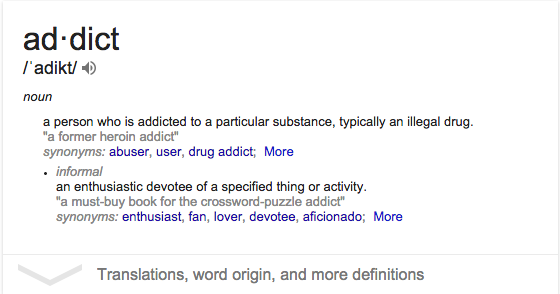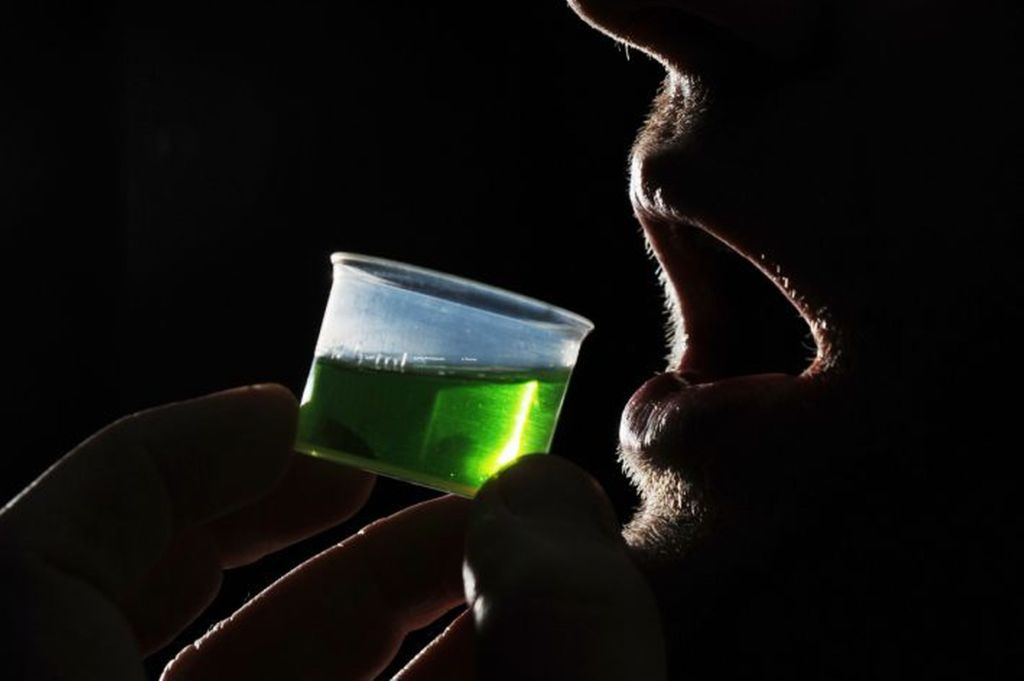What is addiction? Are food and sex addiction real addictions?

When we discuss addiction, we think alcohol or drugs.
But many behaviors can become addictive, especially if they produce a powerful enough chemical reaction that causes us to seek pleasure through those behaviors at a rate that affects everyday life.
Lisa Respers France, a senior producer at CNN, talks about her struggle with food addiction:
Food is my drug.
According to the informal definition, an “addict” is “an enthusiastic devotee of a specified thing or activity.” That’s me, all day. You couldn’t find anyone more enthusiastic about food and eating than yours truly.
That is a truly informal definition, the one you find when you Google “addict”, but it’s a cultural one and not a correct one.

This definition of “addict” makes it sound like an addict likes what they’re doing. That the only reason why they do it is because they derive pleasure from it.
Someone who goes to church every Sunday would be considered an addict by this definition.
Someone who shops at the same grocery store every week–addict. A retiree who plays golf regularly–addict.
In fact, many addicts don’t even like what they have to do. They may dislike the taste of the alcohol or having to swallow the drugs. The only thing they’re devoted to is the feeling they get from the activity. They’ve created such a powerful association that they’ve become chemically dependent on the substances their body creates when the activity is performed.

France continues to describe her food addiction:
I have driven a stupid amount of miles to satisfy a craving and even canceled on friends to sit in my house and eat. More of my money has been spent dining in good restaurants and buying groceries than some people make in a year. I’ve eaten to the point of getting sick and once I was empty, have eaten again.
This is a psychological condition, and while it may seem like an addiction, it is a biological requirement that she eats, similar to how we have a biological drive to reproduce.
This is why sex and food addictions are different from drug and alcohol addictions. If you don’t eat for a few days, you die. You can go a lifetime without having one drink or taking one drug. You can also go a lifetime without sexual intercourse, but there is a biological drive to have it.

Alcohol, drugs, and sex are chemical shortcuts. They have their own pathways to manipulate the body’s chemical structures to release enjoyable chemicals.
If they are used to heal trauma during formative years when brain chemicals are produced in high amounts, or after traumatic situations where brain chemicals are produced in high amounts, then the body remembers the substance that brought upon the positive feelings. This is why you see that most addicts either start at an early age or after a major life transition.
Sex addiction is its own addiction, and is usually the by-product of either sexual, physical, or emotional abuse or major trauma during formative years. The addict becomes addicted to the shortcut of feeling chemical intimacy, which in turn brings a sense of safety, warmth, or comfort.

Food addiction is also its own addiction, and is the by-product of abuse, trauma, or difficulty at a formative stage.
Listen to France explain her struggle:
I hate that I crave the numbing power that food represents to me. The moment I begin to feel happy or sad, I turn to food. Sometimes it’s in celebration and sometimes it’s to achieve a level of bliss that means I don’t have to hurt or process what I am feeling.
See? France is struggling with emotional regulation, and is using food to feel the positive chemicals that are a shortcut to dealing with difficult situations.
Tough day at work? Dinner with co-workers. Fight with a family member? High fat snacks. Who needs tears when there are donuts to be had?
In essence, France is avoiding dealing with parts of her life that are a struggle. Notice how she turns to food for a variety of situations, both in a group setting, which is a good distraction and feeling of safety for people going through struggle, to using food as a comfort when she’s alone.
And like all addictions, food addiction has consequences.
It’s a neverending cycle; being fat makes me feel uncomfortable and feeling uncomfortable drives me to the behaviors that make me fat.
The consequence of food addiction is weight gain, which leads to France having a more negative self image, which leads her to eat more, which leads her to gain weight.
A good friend once told me that I should view the parts of me that need to heal as a younger version of me who I needed to protect. I should talk to “Little Lisa,” she said, and tell her how worthy she is of health, self-love and an abundant life.
Only by peeling back the layers of pain, she said, could I get to the real emptiness that I needed to feed — that part of me that doesn’t believe I deserve the blessed life I have with a career, family and friends that I adore.
This is a therapeutic approach known as “self-healing”, and it works by becoming, in essence, a parent to the part of you that is still stuck at an age when damage was caused. A young Lisa was hurt deeply, and a young Lisa has been trying to relieve the pain of that hurt through the comfort and abundance of eating and using that as a form of protection so that Lisa can’t get hurt again.

There are many of you out there who struggle from addiction. I know that I have. And whether you’ve been told you have an ‘addictive personality’, or whether you’re ‘genetically-predisposed to addiction’–it all doesn’t matter.
We’re individuals who have dealt with difficult situations in life in compromising ways, and whether we’ve hurt just ourselves or ourselves and others, perpetuating the cycle of pain through perpetuating addiction never leads to happiness or a point where you jump up and say, “I’m healed!”

No man has ever snorted enough coke to heal himself.
No woman has ever drank enough vodka to heal herself.
Nobody has ever had enough sex and said “you know what, all of my childhood trauma is healed now.”
And you can never eat enough to make the pain go away.
But you can decide to talk to that little version of you in your life. And if you’re afraid to do it, you can ask for help from a trusted individual or a professional to help you get there.
You can find where that pain started. And you can learn strategies to heal it in an adult way so that you are never trapped in the cycle of feeding pain through addiction.
Because even if nobody is there for you–you are.








